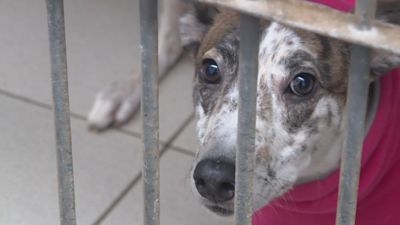Fake strays: Abandoned dogs leaving charities with huge vet fees

Video by ITV News reporter Charanpreet Khaira
The rise of so-called "fake strays" being handed in to animal rescuers post-lockdown is leaving charities with vet bills of up to £30,000 a month.
"Fake strays" are when dog owners take their pets to shelters or vets pretending they found them wandering the streets.
These animals often have complicated health problems and are abandoned because owners struggle to cope with caring for them.
Hope Rescue in Pontyclun has seen hundreds of dogs surrendered to their care in the last year – with figures now at an all-time high.
Sara Rosser, head of welfare at Hope Rescue, said: "Rescues are very busy at the moment - all under an immense amount of pressure.
"A lot have waiting lists but when a dog is found straying there is a responsibility for the local authority to find that dog a space.
"So if we do have a stray in we are obliged to take it."
The beginning of the pandemic saw a sharp rise in the demand for dogs as people spent more time at home.
This trend inevitably fuelled an increase in the number of animals being abandoned at rescue centres.
Sara explained: "We tend to see that after Christmas more people might be in financial difficulties - that problem is compounded at this time of year.
"We also see more dogs that have struggled with the busyness of the Christmas period and then an owner isn’t coping, more people going back to work, more people struggling with vet fees and behavioural problems this time of year."
Puppy farming continues to be a problem as illegal sellers try to meet the demand.
A raid on an illegal farm in Carmarthenshire last year saw over 200 dogs rescued.
47 of the dogs - including puppies, pregnant and newly mothered - were taken into Hope Rescue’s care.
"The money that a dog could go for over lockdown doubled," Sara explained.
"So you saw people who weren’t breeding for good health or behaviour just for profit.
"Buyers already on the backfoot - not set up for success because not been bred for the home in a suitable environment.